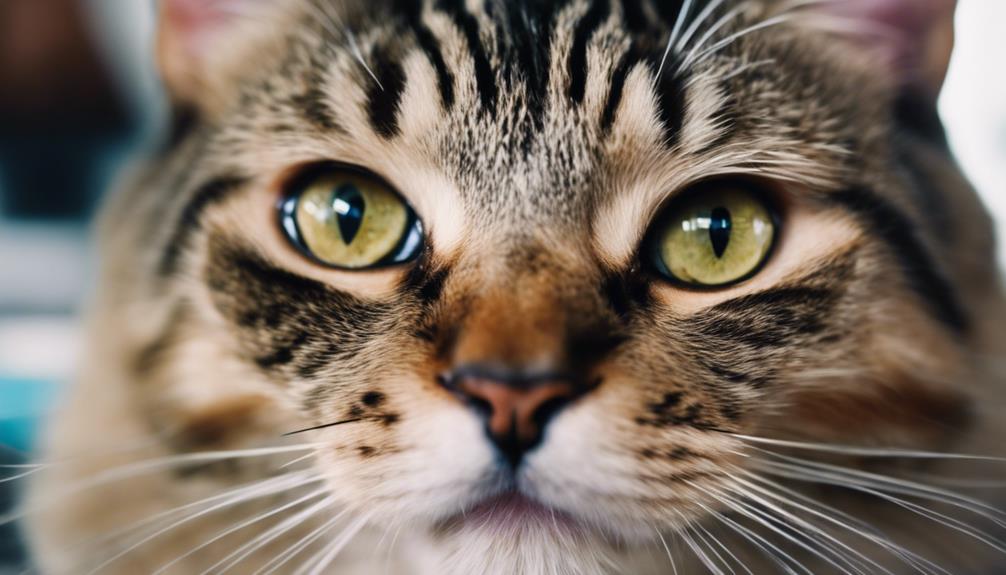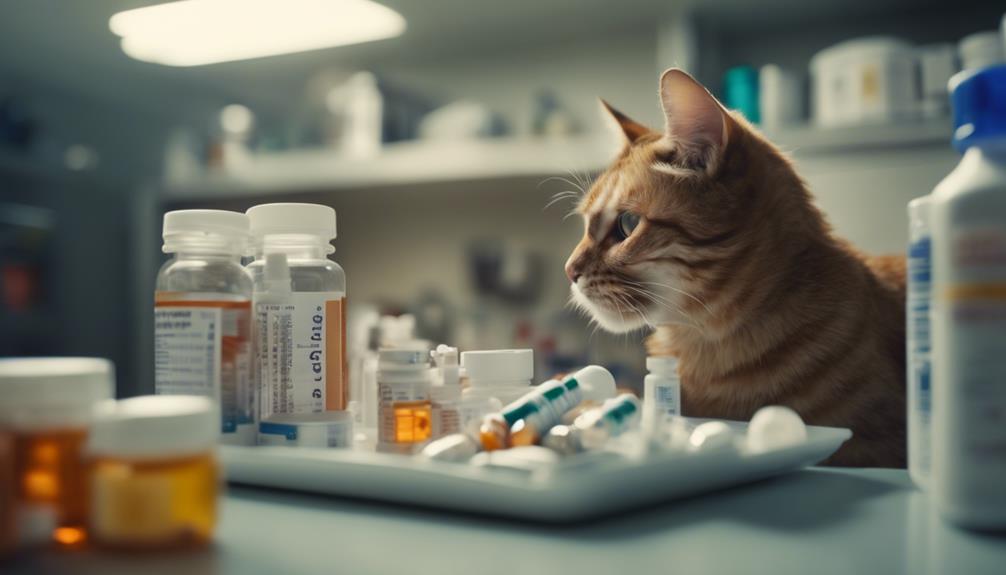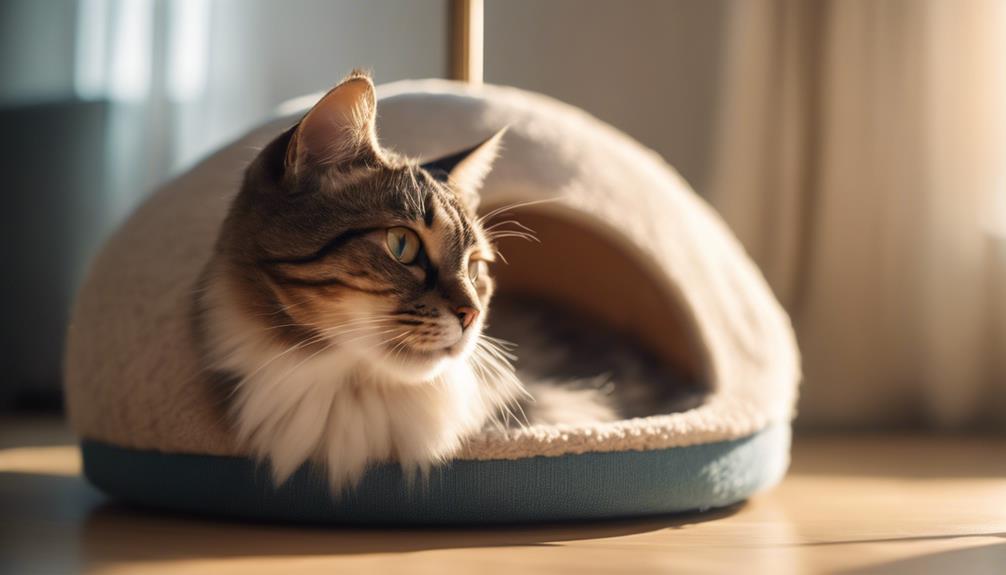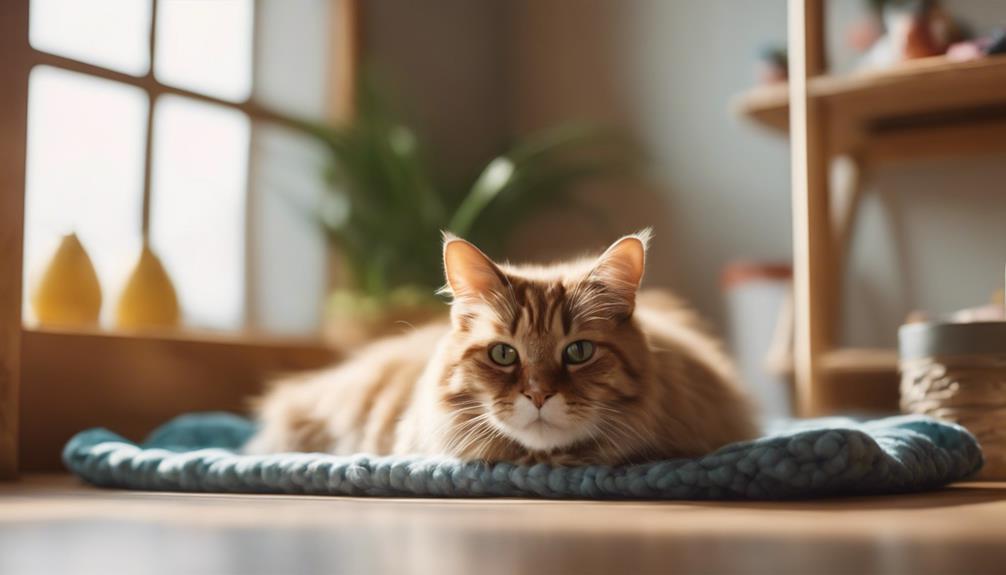Feline Immunodeficiency Virus (FIV) poses a complex challenge for cat owners and veterinary professionals alike. It requires a nuanced understanding of its transmission, impact, and management.
From the subtle signs that may indicate infection to the intricacies of treatment options and preventive measures, navigating the realm of FIV demands attention to detail and informed decision-making.
With implications for both infected cats and their feline companions, exploring the depths of FIV promises to shed light on crucial considerations essential for safeguarding the well-being of our beloved pets.
Key Takeaways
- FIV weakens cats' immune systems, making them vulnerable to secondary infections.
- Testing for FIV involves blood tests like ELISA and PCR for accurate diagnosis.
- Management focuses on symptom control, regular vet check-ups, and indoor living.
- Vaccination for FIV is not core, as existing vaccines have limitations in effectiveness.
FIV Overview and Prevalence
Feline Immunodeficiency Virus (FIV) is a retrovirus that globally impacts approximately 2-5% of cats in North America. This virus weakens the immune system, making affected cats more susceptible to secondary infections. While FIV itself does not directly cause death, it can significantly impact a cat's health and quality of life.
Understanding the prevalence of FIV is crucial for cat owners to recognize the potential risks their feline companions face. By staying informed and proactive, cat owners can work with veterinarians to provide the best care and support for their beloved pets. Regular testing and preventative measures are essential in managing FIV and ensuring the well-being of infected cats.
FIV Transmission and Impact
The transmission of Feline Immunodeficiency Virus (FIV) primarily occurs through direct contact, posing a significant impact on the affected cats' immune system and overall health. This virus is mainly spread through cat-to-cat interactions, particularly via bite wounds. The following table outlines key points regarding FIV transmission and its impact:
| Transmission | Impact |
|---|---|
| Cat-to-cat contact | Weakens immune system |
| Bite wounds | Susceptibility to infections |
| Rare maternal transmission | Chronic health issues |
Understanding how FIV spreads and affects cats underscores the importance of prevention strategies and regular veterinary care for infected felines.
FIV Signs and Testing Methods

Manifesting as non-specific symptoms, the signs of Feline Immunodeficiency Virus (FIV) in cats often require specific testing methods for accurate diagnosis. These signs may include enlarged lymph nodes, fever, weight loss, and poor appetite.
To confirm FIV infection, veterinarians typically conduct a simple blood test. Enzyme-linked immunosorbent assay (ELISA) is commonly used to detect antibodies produced by the cat's immune system in response to the virus. Polymerase chain reaction (PCR) tests can also be employed to identify viral DNA in the blood.
It's important to note that FIV symptoms can resemble those of other illnesses, making proper testing crucial for an accurate diagnosis and appropriate management.
Managing FIV in Infected Cats
When it comes to managing FIV in infected cats, a comprehensive approach focusing on symptom control and preventive measures is essential for ensuring the well-being of these feline companions.
While there is no cure for FIV, supportive care and regular veterinary check-ups are crucial in maintaining the health of infected cats.
Keeping FIV-positive cats indoors can help prevent the spread of the virus to other felines.
In some cases, antiviral medications may be prescribed to manage the condition and improve the quality of life for infected cats.
FIV Treatment and Care Guidelines

Effective management of Feline Immunodeficiency Virus (FIV) involves implementing tailored treatment plans and meticulous care protocols to safeguard the health and well-being of infected cats. While there is no cure for FIV, focusing on symptom management is crucial.
Providing infected cats with regular veterinary exams, keeping them indoors to prevent transmission, and administering antiviral medications or supportive care as needed are vital components of their care. It is essential to prioritize the overall health of FIV-positive cats, promptly addressing any signs of illness or infection.
FIV Transmission Risks and Vaccination
What are the primary modes of transmission for Feline Immunodeficiency Virus (FIV) in cats, and how does vaccination play a role in mitigating these risks?
FIV is mainly spread through bite wounds from infected cats, making outdoor fights a significant risk. Intact male cats are especially vulnerable due to their territorial behavior. Although rare, transmission from an FIV-positive mother cat to her kittens can occur. Additionally, infected blood, such as through transfusions, presents a potential route of spread.
While historical FIV vaccines exist, they are not considered core vaccines by the American Association of Feline Practitioners (AAFP) and are not 100% effective. It's essential to note that vaccinated cats may still test positive for FIV on antibody tests.
Life Expectancy of FIV-Positive Cats

Understanding the life expectancy of FIV-positive cats is crucial for guiding appropriate care and management strategies for these feline companions. While FIV does not directly cause death in cats, it weakens their immune system, making them more susceptible to secondary infections and illnesses. With proper care and attention, FIV-positive cats can live fulfilling lives. The table below illustrates the potential factors that can influence the life expectancy of FIV-positive cats:
| Factors Influencing Life Expectancy | Description |
|---|---|
| Overall Health | Regular vet check-ups, healthy diet, and prompt treatment of illnesses can prolong life. |
| Environmental Stressors | Minimizing stress, providing a safe and comfortable living environment can enhance well-being. |
FIV Stages and Health Risks
Continuing our exploration of Feline Immunodeficiency Virus (FIV), understanding the various stages of FIV and associated health risks is essential in providing optimal care for affected cats.
- Acute Stage: Initial phase after infection, often asymptomatic or mild flu-like symptoms.
- Asymptomatic Stage: Long period without visible signs, virus silently attacks the immune system.
- Clinical Stage: Immune system significantly compromised, leading to frequent infections and illnesses.
- Health Risks: Increased susceptibility to secondary infections, anemia, dental issues, and certain cancers.
Knowledge of these stages and risks can guide caregivers in monitoring FIV-positive cats closely for any signs of deterioration and providing timely interventions to maintain their well-being.
Housing FIV-Positive Cats Safely

When housing FIV-positive cats, it is crucial to prioritize their health and safety by implementing proper containment measures. These cats should be kept indoors to prevent the spread of the virus to other felines and to reduce their exposure to potential infections.
Creating a separate living space for FIV-positive cats, complete with cozy bedding, stimulating toys, and regular access to fresh water and nutritious food, is essential. Ensure the environment is clean, comfortable, and secure to minimize stress and promote their overall well-being.
Regular veterinary check-ups and monitoring for any signs of illness are also important to maintain the health of these special feline companions.
Frequently Asked Questions
Can Fiv-Positive Cats Safely Live With Other Pets in the Household?
FIV-positive cats should ideally live separately from other pets to prevent disease transmission. Strictly follow guidelines to ensure their well-being and minimize risks to other animals. Consult a veterinarian for personalized advice on managing multi-pet households with an FIV-positive cat.
Are There Any Specific Dietary Recommendations for Cats With Fiv?
Cats with Feline Immunodeficiency Virus (FIV) may benefit from high-protein, easily digestible diets to support their immune system. Consult a veterinarian for tailored dietary recommendations based on the cat's health status and individual needs.
How Often Should Fiv-Positive Cats Be Retested for the Virus?
FIV-positive cats should be retested every 6-12 months as recommended by veterinarians. Regular monitoring is crucial due to potential variations in test results over time. Consult with your vet for personalized retesting schedules based on individual cat health.
Can FIV Be Transmitted to Humans or Other Animals?
Feline Immunodeficiency Virus (FIV) cannot be transmitted to humans. While it primarily affects cats, caution is advised with other feline species due to potential transmission. Consult a veterinarian for specific advice on prevention and management.
Are There Any Alternative or Complementary Treatments for FIV in Cats?
While alternative and complementary treatments for FIV in cats exist, such as immune-boosting supplements and holistic therapies, these should complement, not replace, conventional care. Consult a veterinarian for personalized treatment plans.
Conclusion
In conclusion, understanding Feline Immunodeficiency Virus (FIV) is essential for cat owners and veterinary professionals to provide optimal care for infected felines.
From recognizing symptoms and testing methods to managing treatment and vaccination considerations, a comprehensive grasp of FIV is crucial in supporting and protecting our furry companions.
By following recommended guidelines and preventive measures, we can help ensure the well-being and longevity of cats diagnosed with FIV.




